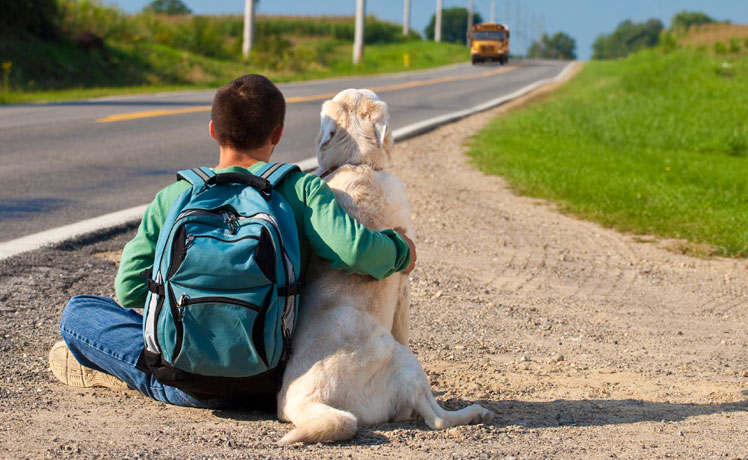
Help Your Pet Avoid the Back-to-School Blues
For many pets, summer is a happy time. They get more attention because the kids are home from school…there are frequently more people around during the day for company…and there are more hours of daylight so families often stay up later and stay outdoors longer.
However, once school doors reopen all that changes. While families return to their work-and-school routines, their pets often return to hours of boredom, restlessness and even loneliness.
In fact, some pets get depressed and others develop separation anxiety. Here’s what to watch for in your dog or cat and what you can do to make the transition less stressful:
Symptoms of Depression in Dogs
- Listlessness and lack of energy
- Loss of appetite
- Hiding
- Is unresponsive, doesn’t want play or engage
Symptoms of Separation Anxiety in Dogs
- Excessive barking and whining
- Frantic clawing to get out
- Destructive behavior, chewing and misbehavior
- Going to the bathroom in the home
 Symptoms of Separation Anxiety & Depression in Cats
Symptoms of Separation Anxiety & Depression in Cats
- Increased or decreased vocalizing: If your cat is a “talker” and suddenly stops, you know something is up; vice versa for the quiet kitties.
- Going to the bathroom outside of their cat box, in your home or on your belongings
- Destructive chewing or scratching
- Loss of appetite or vomiting when left alone
- Hiding or “clinging” to you, following you from room to room
- Poor grooming or excessive grooming
What You Can Do to Help Your Pet
- First, rule out any other underlying causes by having us examine your pet. For example, urinating in the home may mean a bladder infection, not separation anxiety, and excessive grooming or chewing on the body may indicate an allergy.
- Exercise your pet in the morning and/or enjoy some playtime: After all, what your pet really wants is your attention and a tired pet is more apt to sleep than act out.
- Create a more stimulating environment for your pet to enjoy while you’re gone. Leave toys out, keep a radio playing and create perches by a window for your cat.
- If possible, have more than one pet. They’ll keep each other company. However, there are a number of factors to consider before introducing a new furry family member into your home. Here are two downloadable tip sheets from the Nebraska Human Society that explain: Introducing a New Cat to Your Resident Cat(s) and Introducing New Dogs to Your Resident Dogs.
- Play it cool…when leaving or arriving home. Don’t get emotional or make a “big deal” of your departure or return. This will help to keep your pets calmer. Remember, they take their cues from you.
- Distract your pet with a toy or small treat when leaving home so that they begin to associate a pleasant experience with your departure.
- If possible, give your pet a mid-day break—especially if you have a dog—or have someone do it for you. If your workdays are very lengthy or your schedule is uncertain, consider taking your pet to a pet “daycare” facility.
- Give your pet attention during the evening and exercise them. Otherwise, an ignored pet can become an anxious and depressed pet.
- Do NOT spank, hit or punish your pet. Their behavior isn’t disobedient, plus your disapproval will simply increase their anxiety and worsen their behavior.
- In some cases medication may be required. There are medications that can be given and other behavior modification therapies that can be tried so contact us before deciding to give your pet away or worse. We’ll do our best to help both you and your pet!
